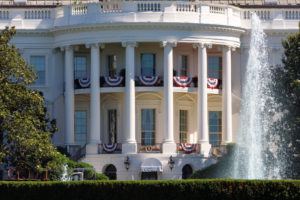
U.S. Senate confirms Wheeler as EPA Administrator, Michael Cohen testifies before Congress, and more…
IN THE NEWS
- In a 52-47 vote, the U.S. Senate confirmed Andrew Wheeler as EPA Administrator. Wheeler has served as acting administrator since former EPA Administrator Scott Pruitt resigned in July 2018. U.S. Senator John Barrasso (R-Wyo.) reportedly stated that despite Wheeler’s deregulatory focus, he has “prioritized commonsense policies” that encourage economic growth. U.S. Senator Susan Collins (R-Maine), the only Republican senator to oppose the confirmation, reportedly stated that Wheeler’s regulatory choices were “not in the best interest of our environment and public health.”
- Michael Cohen, President Trump’s former personal attorney, testified before Congress about President Trump’s conduct during and after his presidential campaign. Cohen’s testimony included allegations that President Trump had violated campaign finance regulations with “hush money” payments. But U.S. House of Representatives member Jim Jordan (R-Ohio) questioned Cohen’s credibility, reportedly stressing the fact that Cohen would be “going to prison in two months for lying to Congress.”
- The U.S. House of Representatives passed legislation to block President Trump’s emergency declaration at the southern border. Representative Hakeem Jeffries (D-N.Y.) reportedly stated that “there is no basis in law or in fact to declare a national emergency,” but House Minority Leader Kevin McCarthy (R-Calif.) said that “the president has the authority” to declare the emergency, and “we will uphold him.” Under the National Emergencies Act, the Senate has 18 days to vote on the legislation, but even if the Senate passes it, President Trump may still use his veto.
- The U.S. Court of Appeals for the D.C. Circuit affirmed a trial court ruling that rejected the federal government’s bid to block the AT&T–Time Warner merger. Judge Judith W. Rogers wrote that the U.S. District Court for the District of Columbia was within its discretion to reject the government’s contentions that the transaction would be anticompetitive. The government reportedly will not appeal the D.C. Circuit’s decision.
- The U.S. Securities and Exchange Commission (SEC) asked a federal district court to sanction Tesla CEO Elon Musk for violating the terms of his securities fraud settlement agreement with the SEC. Under the agreement, Musk must get the SEC’s approval before disseminating “information material to Tesla or its shareholders,” including on social media. But Musk did not get approval before tweeting about how many cars Tesla anticipated on building, followed soon after by a correction, according to the SEC. The federal district court scheduled a hearing to determine whether Musk should be sanctioned for violating the settlement agreement.
- At a U.S. Senate Committee on Finance hearing, a bipartisan group of lawmakers questioned chief executives from several pharmaceutical companies about the high prices of prescription drugs. Senator Ron Wyden (D-Ore.) alleged that AbbVie, manufacturer of the arthritis drug Humira, participated in price gouging above the cost of research and development. AbbVie defended its prices as reasonable in light of business costs. Meanwhile, Merck acknowledged that patients without insurance are sometimes “paying the most” for prescription drugs, but the companies allegedly blamed the drug pricing system on pharmacy benefit managers and insurers who can buy drugs on discounts unavailable to the uninsured.
- Judge Dabney L. Friedrich of the U.S. District Court for the District of Columbia allowed the Trump Administration to proceed with its rule banning bump stocks—devices that allow semi-automatic guns to fire more rapidly. Bump stock owners are required to turn in or destroy these devices before the rule comes into effect on March 26.
- The U.S. Federal Trade Commission (FTC) fined media app TikTok $5.7 million for collecting personal information from children under the age of 13 without parental consent. FTC Chairman Joe Simons stated that this penalty “should be a reminder to all online services and websites that target children” that the FTC takes enforcement of the Children’s Online Privacy Protection Act “very seriously.” TikTok replied that it would work to create an “age-appropriate app experience,” including “extensive limitations on content and user interaction.”
- Several federal agencies—including the U.S. Department of Homeland Security (DHS) and U.S. Customs and Border Protection—launched the Opioid Detection Challenge, asking “innovators” to submit plans for “automated” and “user-friendly…tools and technologies” to detect illicit opioids being sent in the mail through international mail carriers. The challenge offers a total of $1.55 million in prizes for the best proposed solutions and “will culminate in a mandatory live test event” organized by DHS.
WHAT WE’RE READING THIS WEEK
- In a column for The Washington Post, Erik Martin of the Oxford Internet Institute argued that the United States should create a Public Broadcasting Service (PBS) on the Internet. He noted that “Americans like public media” such as NPR and PBS, yet public media outlets are threatened by cuts to their government funding and a challenging business landscape dominated by tech companies that “own many of the railways on which the rest of the media runs.” To maintain public media, Martin suggested an influx of funding or a grant of statutory authority to the Federal Communications Commission to mandate offerings of low- or no-cost educational programs by companies such as Amazon, Netflix, and AT&T.
- England should not create a direct regulation to increase the health and safety of prisoners, argued Nasrul Ismail and Nick de Viggiani of the University of the West of England in a recent paper. Instead, Ismail and de Viggiani asserted that “self-regulation” with a focus on overcoming “barriers” to a healthy prison agenda would be “the most appropriate” solution.
- In a forthcoming article for the Utah Law Review, Lars Noah of the University of Florida Levin College of Law discussed the federal government’s responses to the prescription opioid crisis. Noah argued that physicians were too quick to turn to opioids and that the U.S. Food and Drug Administration (FDA) ought to have been more forceful in regulating opioids when they first came onto the market. He concluded that FDA should have “allowed only a narrowly defined subset of physicians” to prescribe opioids and suggested that FDA adopt this approach for new drugs.



